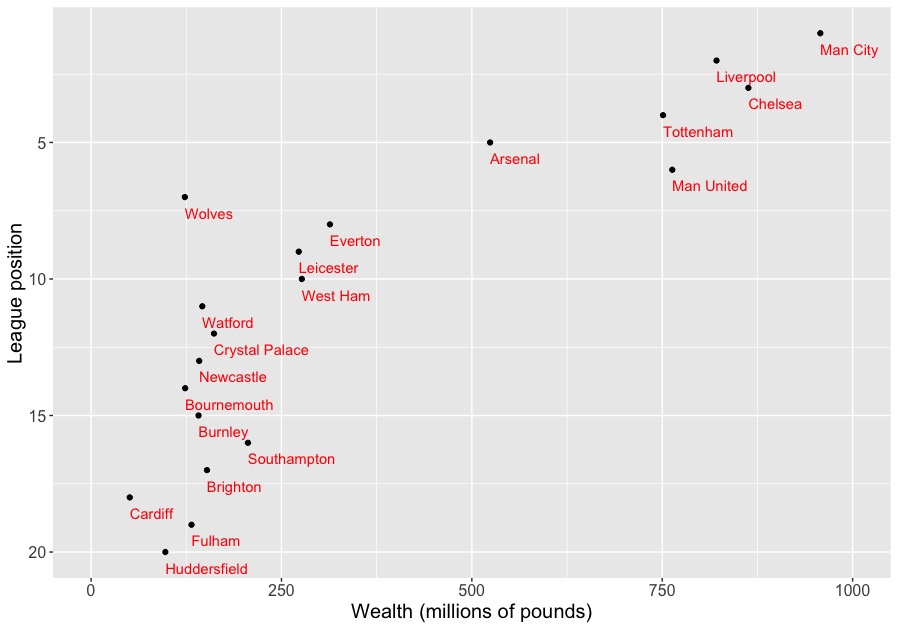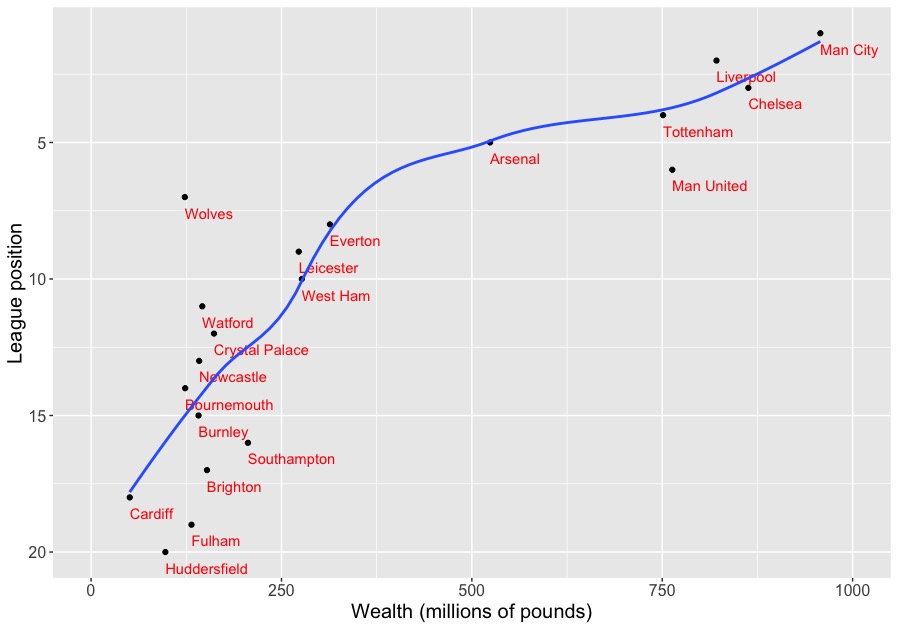Ok, money can’t buy you love, but can it buy you the Premier League title? We’ll look at that below, but first this recent Guardian article notes the following Premier League statistics:
Between 2003 and 2006 there were just 3 instances of a team having more than 70% of possession in a game. Two seasons ago there were 37, last season 63 and this season 67.
In other words, by even the simplest of statistical measures, Premier League games are becoming increasingly one-sided, at least in terms of possession. And the implication in the Guardian article is that money is the driving factor behind this imbalance. But is that really the case?
This graph shows final league position of the 20 Premier League teams plotted against their wealth in terms of start-of-season squad market value (taken from here).

To make things slightly clearer, the following diagram shows the same thing, but with a smooth curve (in blue) added on top, estimated using standard statistical techniques, which shows the overall trend in the data.

Roughly speaking, teams above the blue line have performed better than their financial resources would have suggested; those below have performed worse.
Bear in mind this is just one season’s data. Also, success breeds success, and money breeds money, so the differential between teams in terms of wealth as a season progresses is likely to increase further. For these reasons and others, not too much should be read into the slight wobbles in the blue curve. Nonetheless, a number of general features emerge:
- It’s a very noisy picture for teams with less than £250 m. Arguably, at that level, there’s no very obvious pattern between wealth and final position: there’s a bunch of teams with between £100 m and £250 m, and their league position within this group of teams isn’t obviously dependent on their wealth. As such, teams in this category are unlikely to get out of the bottom half of the table, and their success within the bottom half is more likely to depend on how well they’ve spent their money than on how much they actually have. And on luck.
- Teams with between £250 m and £500 m are likely to force their way out of the ‘relegation-battle pack’, but not into the top 6 elite.
- The cost of success at the top end is high: the blue curve at the top end is quite flat, so you have to spend a lot to improve your position. But money, as long as there’s enough of it, counts a lot for elite clubs, and the evidence is that the teams who are prepared to spend the most are likely to improve their league position.
- A couple of clubs stand out as having performed very differently to what might be expected: Manchester United have considerably under-performed, while Wolves have substantially over-performed.
The trials and tribulations of Manchester United are well documented. Chances are they just need a change of manager. <Joke>. But Wolves is a much more interesting case, which takes us back to the Guardian article I referred to. As discussed above, this article is more about the way money is shaping the way games are played rather than about the success it brings, with matches between the rich and poor teams increasingly becoming challenges of the attack of one side against the defence of the other. But Wolves have adapted to such imbalances, playing long periods without possession, and attacking with speed and precision when they do have the ball. The template for this type of play was Leicester City in their title-winning season, but even though it was just a few seasons ago, the financial imbalances were far smaller than now.
It seems then, that to a very large extent, a team’s performance in the Premier League is likely to be determined by its wealth. Good management can mitigate for this, just as bad management can lead to relatively poor performance. But even where teams are punching above their weight, they are having to do so by adapting their gameplay, so that matches are still dominated in terms of possession by the wealthier sides. As the Guardian article concludes:
Money guides everything. There have always been rich clubs, of course, but they have never been this rich, and the financial imbalances have never had such an impact on how the game is played.
